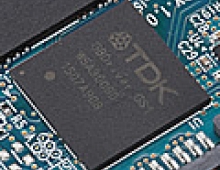
TDK Develops HDD Heads with High Impact Resistance
TDK Corporation announced today that it has developed a new head structure using technology obtained from Matsushita Electric Industrial Co., Ltd. that features dramatically improved impact resistance, a common cause of defects in hard disk drives (HDDs). The new heads are scheduled to enter mass production in the second half of 2003. Consumer products are expected to be an important growth area as new applications for HDDs contribute significantly to the expansion of HDDs usage.
As result of the widespread use of the Internet and the progress of communications infrastructure development as well as the spread of interactive communications devices including PCs, cell phones, and personal digital assistants (PDAs), an era in which large volumes of information travels around the world has arrived. It is also now possible to create trans-national communities freely. In addition, the further miniaturization of the means of interactive communications made possible by steady advances in technology has accelerated the "personalization" of information, and we are about to enter an era of "ubiquitous information" in which anyone can utilize any information from anywhere at any time.
Storage devices that can temporarily store data are absolutely essential for mobile information devices, which are an important means of interactive communication even as their functions continuously increase and they are made ever smaller. The compact HDD is considered the optimal storage device to meet such requirements. HDDs are limited, however, by the problem of damage if they are dropped, and this posed a significant technology hurdle.
The newly-developed technology comprises a floating design technology that increases the air pressure between the head and the disc while making it possible to reduce that distance to just 20 nanometers and balancing the moment of inertia of the head arm assembly against impact. The combination of these two fundamental technologies enables the HDD to withstand impacts of 1000 gravities (Gs) or more while operating*2 , more than five times current levels. The product consists of a head slider and a suspension or head arm assembly to which the new technology has been applied.
The development and commercialization of this technology will greatly enhance the performance of HDDs, providing them with the impact resistance of solid-state memory devices such as semiconductor memory despite being a mechanical device. As a result, the HDD market will dramatically expand to include applications such as navigation systems, mobile devices including PDAs, and home electronics devices as well as cell phones, in which the use of HDDs was not possible despite a desire to use them because of the problem of impact resistance.
Storage devices that can temporarily store data are absolutely essential for mobile information devices, which are an important means of interactive communication even as their functions continuously increase and they are made ever smaller. The compact HDD is considered the optimal storage device to meet such requirements. HDDs are limited, however, by the problem of damage if they are dropped, and this posed a significant technology hurdle.
The newly-developed technology comprises a floating design technology that increases the air pressure between the head and the disc while making it possible to reduce that distance to just 20 nanometers and balancing the moment of inertia of the head arm assembly against impact. The combination of these two fundamental technologies enables the HDD to withstand impacts of 1000 gravities (Gs) or more while operating*2 , more than five times current levels. The product consists of a head slider and a suspension or head arm assembly to which the new technology has been applied.
The development and commercialization of this technology will greatly enhance the performance of HDDs, providing them with the impact resistance of solid-state memory devices such as semiconductor memory despite being a mechanical device. As a result, the HDD market will dramatically expand to include applications such as navigation systems, mobile devices including PDAs, and home electronics devices as well as cell phones, in which the use of HDDs was not possible despite a desire to use them because of the problem of impact resistance.





















